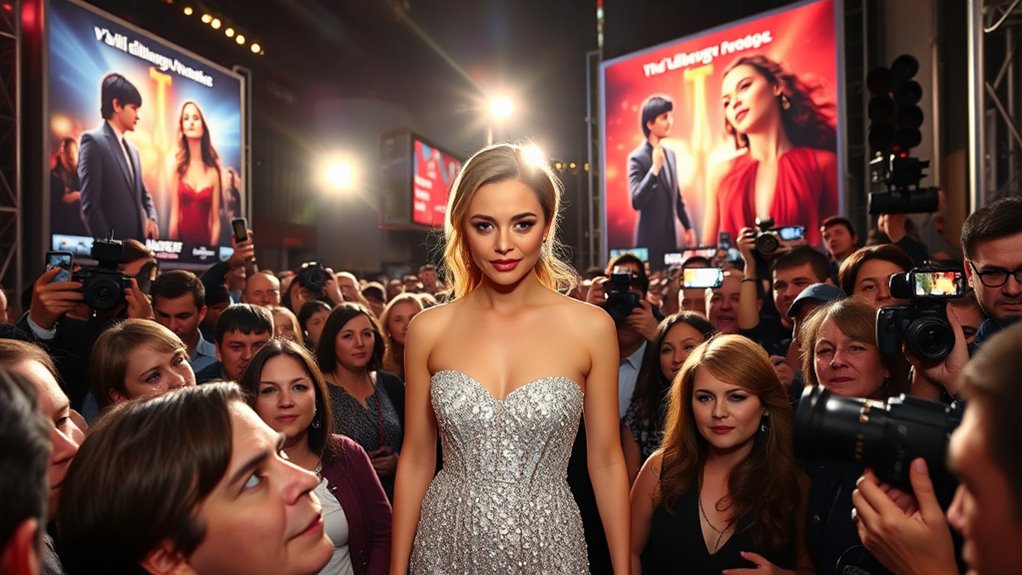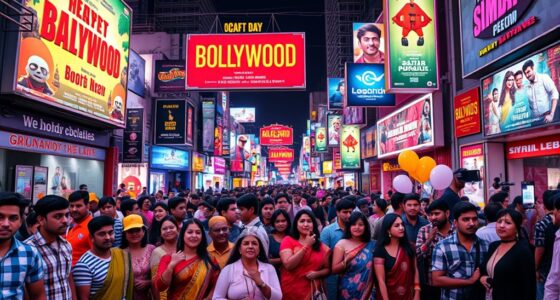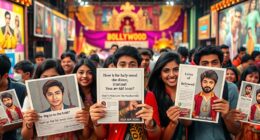You might feel she’s overhyped because media manipulates our perceptions, often showcasing unrealistic beauty standards and an inflated sense of celebrity worth. Social media plays a huge role, creating a false sense of closeness and constant engagement. This can lead to unhealthy behaviors like materialism and a warped self-image. Many celebrities gain fame without significant contributions, and public interest can become overwhelming. Stick around to discover more about this fascinating phenomenon and its consequences.
Key Takeaways
- Celebrity overhype often stems from media portrayals that inflate their importance and create unrealistic standards.
- Social media fosters a false sense of intimacy, enhancing public obsession with overhyped celebrities.
- Many celebrities capitalize on endorsements, prioritizing profit over genuine talent or quality in their work.
- The “cheerleader effect” amplifies perceived attractiveness, contributing to the overhype surrounding certain stars.
- Constant media exposure leads to fatigue and scrutiny, revealing the superficiality of their contributions to entertainment.
Celebrity Overhype: Understanding the Phenomenon

When you think about the obsession with celebrities, it’s clear that several psychological factors play a significant role in this phenomenon.
Celebrity worship syndrome (CWS) can grip you, leading to unhealthy behaviors like materialism and compulsive buying. The “cheerleader effect” makes celebrities seem even more attractive, and social media creates a false sense of closeness. This overhype often stems from peer influence and strategic marketing, with celebrity fashion serving as a marketing tool for their brands. As you get swept up in the excitement, remember that many celebrity fashion brands prioritize profit over quality, which can lead to disappointment.
The allure of exclusivity can be misleading, making you question the authenticity of celebrity endorsements. Ultimately, it’s crucial to recognize these influences and their impact on your perception of celebrity culture.
Media Influence on Celebrity Image

As you scroll through social media or flip through magazines, it becomes evident that media plays a pivotal role in shaping celebrity images. Celebrities often embody unrealistic beauty standards, leading many to compare themselves unfavorably, especially young audiences.
Research shows that 76% of adults believe these portrayals negatively impact women’s body image. This constant exposure can foster body dissatisfaction and maladaptive behaviors like disordered eating, with nearly half of girls aged 13-17 wishing to be as skinny as models in fashion magazines due to unrealistic media images.
However, some celebrities challenge these norms by promoting body positivity and mental health awareness, encouraging open discussions. Through selective portrayal and media influence, public perception of celebrities shifts, demonstrating the powerful cultural significance they hold.
Ultimately, you’re not just consuming celebrity images; you’re navigating a complex landscape that shapes societal values and personal identities.
The Role of Social Media in Shaping Perceptions

Social media profoundly influences how you perceive yourself and others, shaping identities in ways that can be both empowering and damaging. With about 70% of adults and 81% of teens using these platforms, the impact is undeniable. You often see curated lives on Instagram or TikTok, where idealized versions of reality can skew your self-image. This strategic self-presentation leads to confusion between the ideal and real self, affecting your confidence and relationships. Additionally, studies show that increased digital media use correlates with reduced face-to-face interactions, further complicating how you connect with others. It’s important to recognize that strong communication skills are essential for building meaningful relationships in both online and offline contexts.
Celebrities, through endorsements, can significantly sway your purchasing decisions and attitudes. While social media offers opportunities for connection and support, it also poses risks to your mental well-being, often promoting unattainable standards. Balancing your online and offline life is crucial for a healthier perception.
Examples of Overhyped Celebrities

With social media shaping perceptions and amplifying celebrity culture, it’s no surprise some stars become overhyped.
Take Angelina Jolie, often criticized for her repetitive roles and focus on image. Matthew McConaughey’s acting style feels stagnant, while Natalie Portman, despite acclaim, shows limited range.
Angelina Jolie’s repetitive roles and image focus, alongside Matthew McConaughey’s stagnant style, highlight a trend of overhyped talent.
Kristen Stewart’s mixed reviews contrast her earnings, and Johnny Depp’s eccentric roles lead many to see him as overrated.
In music, Beyoncé, Lady Gaga, and Miley Cyrus face scrutiny for media saturation.
Reality stars like Heidi Montag and the Jersey Shore cast gain fame without significant contributions.
Even film personalities like Zendaya and Sydney Sweeney risk becoming overexposed, while public figures like MrBeast and Jennifer Lopez struggle with authenticity.
Factors Contributing to Overhyped Status

While the allure of celebrity life captivates many, several factors contribute to the perception of overhyped status.
First, constant media coverage creates an illusion of their omnipresence, making you feel their lives matter more than yours. Social media amplifies this by providing endless updates that keep you hooked. Celebrities like Paula Deen(Paula Deen’s Wedding Highlights) often showcase extravagant events that further draw public fascination.
There’s also a psychological angle; your aspirational desire and emotional attachment inflate their significance. Celebrities serve as an escape from daily life, and society’s validation reinforces this inflated view. JavaScript must be enabled to properly access the content related to these celebrities, which further fuels their overhyped status.
Economically, the lucrative nature of endorsements and media profits drives relentless coverage.
Lastly, the evolution of media and the celebrity culture itself has turned fame into an obsession, making it all feel more significant than it truly is.
Public Reaction and Fan Engagement

Celebrity status isn’t just shaped by the media; public reaction and fan engagement play a significant role in how overhyped a celebrity appears. Extensive media coverage often skews public perception, especially when paired with enthusiastic fan engagement. Engaging in mindfulness practices can help fans reflect on their genuine feelings towards celebrities and assess the influence of hype.
You might notice that social media amplifies these sentiments, leading to heightened visibility and mixed opinions about stars. While some fans defend their favorites, others express backlash through hashtags, showcasing the divided views on perceived hype. In the case of Priyanka Chopra, her high-profile marriage with musician Nick Jonas has also contributed to the perception of her being overhyped.
Influencers also sway public opinion, further complicating how you see these celebrities. By participating in trends or live events, celebrities can engage directly with fans, shifting perceptions from hype to genuine talent.
Ultimately, fan loyalty and interaction are crucial in shaping a celebrity’s image.
Navigating Career Consequences of Being Overhyped

Navigating the career consequences of being overhyped can be challenging, especially when the initial excitement fades. You might find that over-specialization limits your employment opportunities, leaving you vulnerable during economic downturns. This narrow focus can stunt your creativity and hinder collaboration with diverse professionals. Additionally, over-specialization can lead to vulnerability if career advancement stalls, your engagement and productivity may dip, affecting your wellbeing and financial stability. You may even feel compelled to seek new opportunities as turnover rates rise among those yearning for growth. Instead, consider building versatility in your skill set. Diversifying your expertise not only enhances your adaptability but also expands your professional network, making you more resilient to market fluctuations while ensuring you remain relevant in a rapidly changing job landscape. Emphasizing strong brand identity can further bolster your professional presence and appeal in the competitive job market.
Frequently Asked Questions
What Defines a Celebrity as “Overhyped”?
A celebrity’s considered “overhyped” when their fame seems disproportionate to their actual talent or contributions.
You might notice excessive media coverage, social media buzz, or marketing strategies that inflate their image.
Frequent public appearances and collaborations can also amplify their visibility, sometimes overshadowing more deserving talents.
When public opinion varies widely, with some fans defending them and critics pointing out flaws, it reinforces the perception of being overhyped in the entertainment landscape.
How Can Celebrities Combat Being Labeled as Overhyped?
To combat being labeled as overhyped, you need to engage authentically with your audience.
Develop a strong social media strategy that showcases your personality and values. Create positive content that highlights your talents and contributions, while collaborating with influencers to amplify your narrative.
Regularly interact with fans through Q&A sessions or behind-the-scenes glimpses. By building trust and demonstrating genuine connection, you can reshape public perception and reinforce your brand value.
Are All Overhyped Celebrities Undeserving of Their Fame?
Did you know that nearly 70% of people believe celebrity culture distracts from more important issues?
Not all overhyped celebrities are undeserving of their fame. Some may have unique talents or contribute positively to society, yet they often get overshadowed by sensationalism.
While it’s easy to dismiss them as excessive, remember that fame can stem from various factors, including hard work, charisma, or even just the right moment.
How Does Public Perception of Overhyped Celebrities Change Over Time?
Public perception of overhyped celebrities shifts significantly over time.
Initially, their appeal may stem from marketing or social media buzz, but scandals or personal revelations can quickly change that.
As you follow their careers, you might notice how cultural trends influence your feelings about them.
If their work evolves positively, you may appreciate them more, but unrealistic expectations can lead to disappointment.
Ultimately, your perception reflects a blend of admiration and societal values.
Can Overhyped Celebrities Ever Regain Public Favor?
Regaining public favor is like climbing a steep mountain; it takes time and effort.
Overhyped celebrities can absolutely bounce back, but it hinges on their actions. By addressing controversies head-on and engaging in philanthropy, they can shift public perception.
Authenticity matters too; being genuine can rebuild trust. Consistent positive actions over time will show fans you’re committed to change, and that can pave the way for a successful recovery.
Conclusion
In the world of celebrity, it’s easy to get swept up in the frenzy, but remember, “all that glitters isn’t gold.” While some stars shine brightly, others may be overhyped, leaving us questioning their true substance. As you navigate the ever-changing landscape of fame, keep a critical eye on media portrayals and social media narratives. Ultimately, distinguishing genuine talent from mere hype will enhance your appreciation of artistry and authenticity in the celebrity realm.









